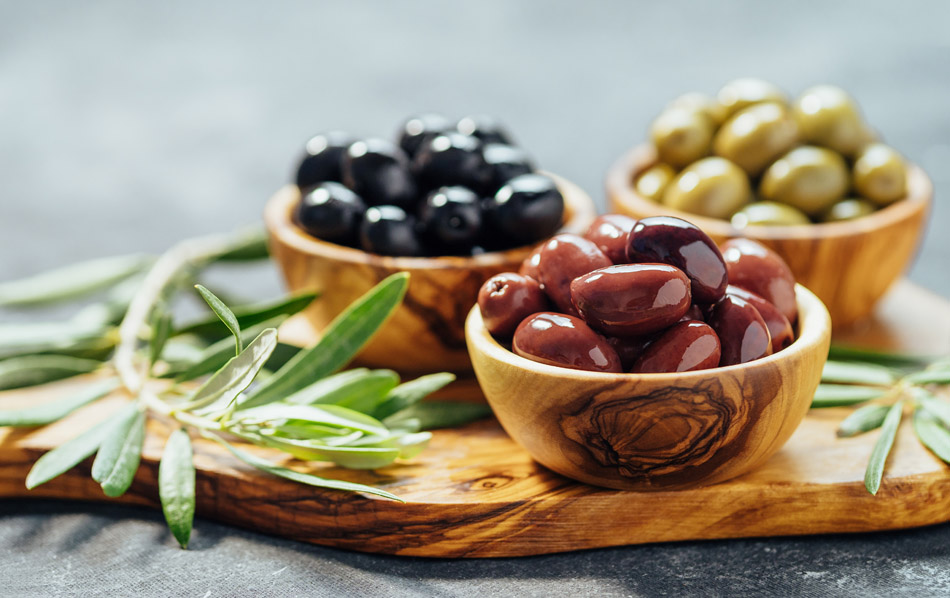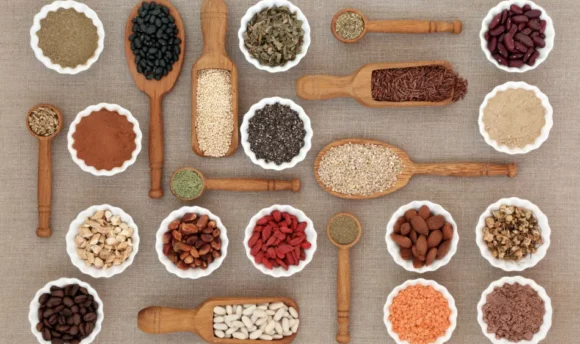Are Olives Healthy? Nutrition and Health Benefits
Olives are an integral part of the Mediterranean diet, ranked as one of the healthiest diets in the world. Whole olives are rich in monounsaturated fat, antioxidants, and vitamins that offer many health benefits, such as the reduced risk of cancer, high blood pressure, and high cholesterol.

Olives are a popular fruit eaten whole as a snack or used in recipes, such as salads and stews. Olive trees are a popular crop along the Mediterranean region, and olive oil and fruit are an integral part of the Mediterranean diet, which the American Heart Association ranks as the top healthy diet that lowers the risk of cardiovascular diseases.
The powerful antioxidants found in olives reduce chronic inflammation that initiates the development of cancer cells, insulin resistance, and high blood pressure. This article will share the health benefits of olives and look into their nutritional content.
What Is an Olive?
An olive is a small, oval fruit of the olive tree, also known as Olea europaea or European olive in Latin, mainly grown in Mediterranean regions, such as New Zealand, Australia, Mexico, South America, and South Africa. Olives are green or black depending on the time of harvest.
Olive trees are a major agricultural produce in the Mediterranean regions, and olive fruit is the source of olive oil. About 90% of the harvest is pressed to make olive oil, while the remaining, known as table olives, is cured and treated to remove the bitter compounds and reserved for consumption. Table olives can be eaten whole or added to recipes and offer many health benefits.
Are Olives Healthy?
Yes, olives are a heart-friendly fruit rich in antioxidants, healthy fats, such as oleic acid, and vitamins that may offer protection against diseases, such as diabetes, stroke, heart disease, and certain cancers.
7 Health Benefits of Olives
#1 Reduces chronic inflammation
Olives contain a rich profile of antioxidants, such as polyphenols, that have anti-inflammatory benefits. Consumption of olives or virgin olive oil has a similar ability to fight chronic inflammation, just like non-steroidal anti-inflammatory drugs, and with no side effects.
Regular use of whole olives or olive oil lowers the risk of diseases, such as cancer, heart disease, and neurogenetic diseases, which are worsened by chronic inflammation.
The anti-inflammatory properties are also effective in wound healing and tissue regeneration, and olive oil is more effective on nipple cracks due to breastfeeding compared to lanolin.
#2 Good for heart health
Olive oil is 75% monounsaturated fatty acids, raising HDL “good” cholesterol and lowering LDL “bad” cholesterol. Studies reveal that the antioxidants found in olives reduce total cholesterol levels and LDL “bad” cholesterol due to their anti-inflammatory properties.
Numerous studies show that regular use of olive varieties or olive oil lowers cholesterol levels and lowers the risk of high blood pressure and heart attacks.
#3 Lowers the risk of some cancers
Research shows that olives can help reduce the risk of cancer, which is due to their high levels of antioxidants and oleanolic acid. The powerful antioxidant properties in olives protect the cells and tissues from oxidative stress caused by free radicals and stop the damage before it starts.
#4 Improves bone health
People who follow the Mediterranean diet have a lower risk of fractures. The antioxidants found in olives protect against bone loss that may result in osteoporosis.
#5 Good for digestion and absorption
Whole olives undergo fermentation during processing. Eating fermented foods adds beneficial bacteria to the gut and helps to balance the gut microbiome. A healthy digestive system improves immune function and reduces the risk of digestive issues, such as constipation or irritable bowel syndrome.
#6 Good for preventing diabetes
Unregulated blood sugar levels cause type 2 diabetes. Research shows that extra virgin olive oil improves insulin sensitivity and can lower the risk of type 2 diabetes because it contains monounsaturated fat, such as oleic acid, and antioxidants.
#7 Improves brain health
Olives contain vitamin E, which improves cognitive functions and reduces the possibility of cognitive decline due to their ability to protect the body from oxidative damage.
The olive polyphenols, such as oleocanthal, reduce the risk of neurodegenerative diseases, such as Alzheimer’s disease. Notably, patients with dementia using the drug donepezil may benefit because oleocanthal improves the activity of the drug.
2 Side Effects of Olives
#1 Olives have a high salt content
Consume olives in moderation because they are preserved in brine or salt water, and eating too much sodium may affect electrolyte balance and cause high blood pressure. 100g of olives contain 735mg of sodium.
#2 High in fat
Although they contain healthy fats, don’t overeat them because the calories can add up fast. Moderate your intake to 2–3 ounces per day to keep your weight loss in check.
Nutrition Facts of Olives
The nutritional profile of canned olives.
Nutritional value (per 100g)
| Calories/Nutrient (per 100g) | Amount |
| Calories (kcal) | 116 |
| Sodium (mg) | 735 |
| Net Carbs (g) | 4.44 |
| Fiber (g) | 1.6 |
| Sugar (g) | 0 |
| Fats (Total) | 10.9 |
| Protein (g) | 0.84 |
| Glycemic Index | 15 |
High in fats
Olive varieties are high in heart-healthy fats. They mainly contain monounsaturated fat known as oleic acid, which raises HDL or “good” cholesterol and is linked to other health benefits, including improved heart health.
Low in calories
Olives are low in calories and are good for weight loss. The fiber makes you full longer and can reduce overeating.
Low in net carbohydrates
Canned olives are low in net carbs and have a low glycemic index. They are a healthy snack for people with diabetes.
Rich in vitamins and minerals
Olives are rich in vitamins A and E and minerals, such as calcium, iron, and copper, that protect from diseases, such as stroke, heart disease, diabetes, and cancer. Vitamin E improves skin health and protects the body from oxidative stress.
Healthy Recipe With Olives
Try this simple, healthy recipe to enjoy the health benefits of olives.
Ingredients
- 10 black olives, pitted and halved
- 2 lean sirloin steaks
- 1 cup cherry tomatoes, halved
- 1 small red onion, sliced into half moons
- 1 teaspoon paprika
- 2 tablespoons olive oil
- A bunch of parsley, roughly chopped
- 1 tablespoon red wine vinegar
Directions
- Rub the steaks on both sides with one tablespoon of olive oil and half the paprika.
- Sear in a hot pan for about 2 minutes on each side. Set aside for 5 minutes, then slice into strips. Add in the tomatoes, onion, olives, parsley, paprika, olive oil, and vinegar.
- Toss until well combined with the steak. Serve with crusty bread if you like.
Check out the Keto Cycle app for more than 10,000 healthy recipes. The app has a customized keto diet plan based on your health status, lifestyle, and nutritional needs for faster and long-lasting weight loss.

- Proven scientific data
- Calorie tracker
- Customized meal plans and food prep
- 10,000+ easy-to-make keto recipes (including vegetarian options)
- Full workout schedule
- Motivational tips
FAQs
Black olives are nutritious, just like green olives, because they contain antioxidants, such as beta-carotene, vitamin E, and polyphenols, that protect the cells against oxidative damage from free radicals and reduce the risk of heart disease and certain cancers.
Olives are fruit, not vegetables. They belong to a group of fruit called stone fruits or drupes, such as mangos, cherries, and peaches. A fruit is a part of a plant that contains a seed or a pit.
Both black and green olives are nutritious. However, green olives are the healthiest because they contain the highest quantity of polyphenols.
Olives are low in calories but a rich source of healthy fats. Foods with a low-calorie density, such as olives, can help with weight loss.
Olives are low in cholesterol. They are a good source of monounsaturated fats that are good for heart health because of the increased levels of HDL “good” cholesterol, and lower LDL “bad” cholesterol.
Olives have antioxidant properties that reduce chronic inflammation in the tissues and anti-inflammatory benefits. According to studies, olives have a natural anti-inflammatory capacity, like ibuprofen, and reduce chronic inflammation in people with rheumatoid arthritis.
Olives are a good source of fiber, which is beneficial to gut health. They contain 1.6g of fiber per 100g.
A Word From Our Nutritionist
Olives and olive oil have numerous health benefits backed by scientific evidence. Olives are a good source of healthy fats, vitamin E, and powerful antioxidants that boost brain health and bone health and are beneficial for the immune system.
Moderate consumption of the superfood reduces inflammation and risk factors for diseases, such as cancer, heart attack, and diabetes. Since olives are a good source of dietary fiber and contain beneficial bacteria due to the fermentation process, adding them to your diet improves gut health.
Eat whole olives as a healthy alternative to highly processed snacks and extra virgin olive oil alongside a low-sodium diet to enjoy the health benefits of the Mediterranean fruit.
Conclusion
Olives make a delicious addition to a low-sodium diet. They have an impressive antioxidant profile and are high in heart-healthy fats and low in carbs. They have also been seen to improve heart health and reduce the risk of diabetes, stroke, and some cancers, as well as keep weight in check.
Incorporate the fruit or extra virgin olive oil into your daily diet to reduce your risk of lifestyle diseases and boost your lifelong health. However, consume olives in moderation because they are preserved in brine that is high in sodium and can increase the risk of heart disease over time.

- Proven scientific data
- Calorie tracker
- Customized meal plans and food prep
- 10,000+ easy-to-make keto recipes (including vegetarian options)
- Full workout schedule
- Motivational tips

















































 Select your language:
Select your language: 







